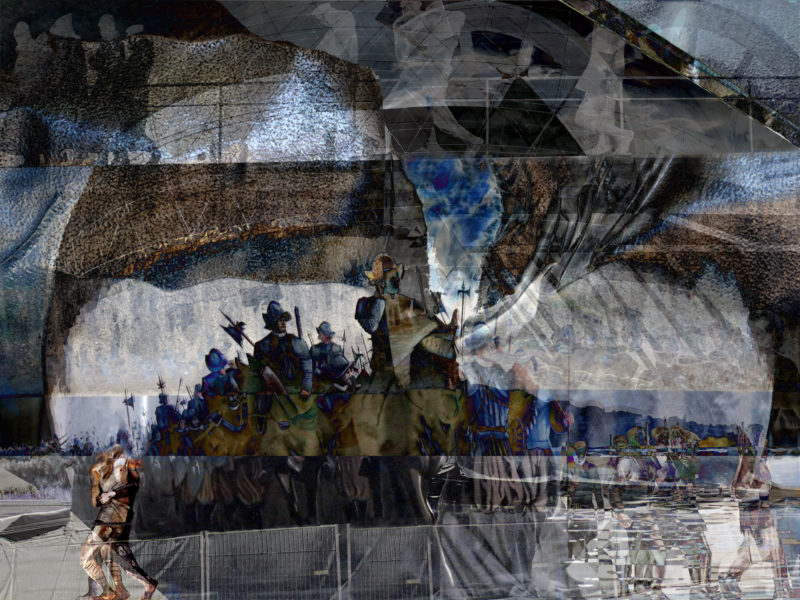Karl Jenkins’ The Armed Man – a mass for peace was commissioned by UK Royal Armories Museum in 1999, and dedicated to the victims of the Kosovo conflict. It uses the structure of a catholic mass, but is filled with diverse, surprising and moving texts from all kinds of sources. As it unfolds it brings the listener closer and closer to the devastation wrought by war, the emotional emptiness and trauma that comes with loss and being a victim as much as with being part of the perpetrating forces. It ends with appeals to hope, with a belief that we can and must pursue peace and that memory of the suffering must be kept alive to avoid repetition of warfare.
The North Coast Chorale in Astoria will perform this piece later this month and I was asked to create photomontages for each movement that will be projected behind the stage, and also shown as prints in the lobby of the concert hall. (For performance details www.northcoastchorale.org; for print information http://lightbox-photographic.com) I will devote this week to showing some of the montages and providing some information about the music that goes with them. We’ll start with the Hymn before action (music here: www.youtube.com/watch?v=pRy6DLIK8aw,) a movement that uses words by Rudyard Kipling.
Kipling was a strange character, in the words of the late Christopher Hitchens: “a man of permanent contradictions.” www.theatlantic.com/magazine/archive/2002/06/a-man-of-permanent-contradictions/302512. He wrote beautiful children’s literature, won the Nobel prize, and yet was at times acting as a racist, certainly an imperialist, and a declared anti-Semite. (He claimed, for example, that Einstein’s relativity theory was part of a Jewish conspiracy to destabilize the world.) But he also understood the cost of war, having lost his own son, and was always weary that Britain would suffer the consequences of imperial hubris.
Photographs of excerpts of war paintings that span centuries – an old Dutch master, Jacob Ruisdael, found in a church in Alkmaar, NL and Aleksandr Dejneka who painted around the times of the Russian revolution – went into the montage. The figures are superimposed on a photograph of the Géode at the city of industry and science, in a suburb of Paris, Parc de la Vilettes. It seems to me that the belief and/or hope in the protective power of a God, as heard in that hymn, has been replaced with the assumption of the infallibility of science creating ever more lethal weapons. Much good it will do….





Steve Tilden
Oh! This music is powerful! And how wonderful you were asked to produce the montages that will accompany. Congratulations, perhaps a bit early, but not premature I’ll wager.
Perhaps some day a ‘growing’ montage for each movement, each image ‘developing’ during the movement.
Well done. Friderike!